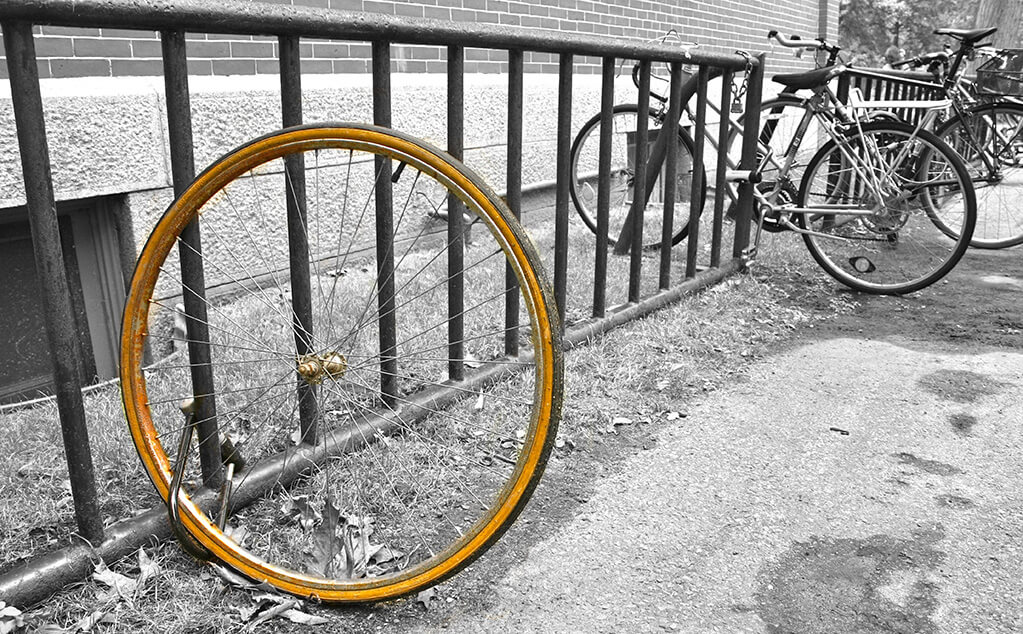Autumn Gear Guide
Find inspiration in our Gear Guide that will keep you out on your bike through wind or rain.
Download NowBike theft is a massive, growing problem. But it isn’t unsolvable if you use the right tools.
The guy who stole J Allard’s mountain bike picked the wrong guy to knock over. Allard, most famous for co-founding XBox during his 19 year stint at Microsoft, is not the type to sit back and let the enemy win the game. So when he realized his bike had been unceremoniously ripped out of the back of his truck in a secure parking garage, he went looking for it.

Photo by henry liu

The bike had a custom paint job, Allard had social media skills. He put the word out on any available channel, and a month later somebody tipped him off to his exact bike posted for sale on eBay. He contacted both eBay and the police, but neither party was willing to do anything about it since he didn’t have the serial number and thus couldn’t definitively prove ownership. Frustrated but not dismayed, he set about conducting his own investigation. Allard discovered the same seller was also listing a number of stolen laptops and other property. He bought one of the laptops, then put his computer science skills to good use taking apart the machine to find out who its original owner was. Once he’d discovered the owner, he found she’d recently filed a car prowl police report which listed the laptop. The police then had enough probable cause to investigate the seller, and in doing so they recovered an abundance of stolen property including, finally, Allard’s mountain bike.
It was a happy ending, but one that took Allard around 80 hours of leg work over 73 days to achieve. It was not an experience he ever wanted to repeat, nor one he would ever wish upon anyone else. Allard realized there was no standardized system to reunite bicycle owners with their stolen rides, so in hopes of sparing others the hassle he had to go through, he decided to build it. With that, Project 529 was born.
Project 529 developed the 529 Garage, an innovative bicycle registration software which aims to solve the problem of bike theft by enabling law-enforcement officials to easily identify stolen bicycles, making it much more difficult for bike thieves to fence stolen property online, and much easier for police to reunite owners with their bikes. The process is simple. Bicycle owners register their ride, using a combination of the serial number, brand, photos, and any other identifying characteristics which might be useful when filing a police report or insurance claim.
If your bike is stolen, a panic button on the 529 Garage app goes out to other users, creating a sort of “neighborhood watch” because other users are made aware of what was stolen, when, and where. It also notifies participating police departments. Similarly, if police recover a stolen bicycle or see someone riding one they believe to be stolen, they can search the database using terms as non-specific as “green Trek,” and then narrow down the results by location, or the window of time in which it was reported stolen to see if they have a match. The various identifiers included in the registration software enable police to match recovered property to the reported thefts in cases where the serial number may already been scratched off, or entered slightly incorrectly by the owner.
“We register everything,” said Allard. “We register our cars, our motorcycles, our phones. Why aren’t we registering our bikes?”
Why more people don’t register their bikes is a conundrum that was similarly plaguing Rob Brunt, a longtime veteran of the Vancouver Police Department (VPD) in British Columbia. Over his 28 years on the force, Brunt recovered some 1,200 stolen bikes off the streets, handing them over to the department with the confidence that he was doing successful police work. When a traffic injury forced Brunt to take a step back from work on the street, he visited the warehouse where the stolen bikes were kept for the first time, and he was shocked at what he found.
A 3-story carousel of recovered bikes greeted him, and not a single person was there to claim any one of them. The VPD confiscates around 2-3,000 stolen bicycles per year, but only 2% are ever reunited with their owners.
“It’s a simple problem,” said Allard. “The cops aren’t sitting around with a parking lot full of cars going ‘hhmm I wonder whose Accord that is.’ With planes, cars, everything, they know exactly who it belongs to. With bikes, because there’s no compulsory registration, they have no way to get the bikes back to the owners.”
Brunt quickly realized he’d spent years pulling stolen bikes off the streets only to have them sit in a warehouse for 90 days before being sold off in auction. He decided something had to change. He began looking for other police departments who were keeping bicycle registries, which led him to the San Francisco PD who had recently started their own. Brunt reached out to SF to see if they had any suggestions for how to set up his own bicycle registration database. Their advice? Don’t bother, just talk to J Allard.
Brunt reached out to Allard, the two met up for a beer, and Brunt returned to Vancouver with a proposal to bring Project 529 into the fold with the city. Within a few months, the chief of police and the mayor were on board, the VPD Foundation agreed to pay for the first 10,000 registrations, and the project was ready to launch. Six months later, 9 more surrounding municipalities are incorporating 529 Garage into their theft prevention strategy, with Brunt acting as a liaison between Project 529 and the municipalities.
“To get all of these people on board so quickly, four months for a new government sponsored program, that never happens,” Allard said.

J Allard.
The degree to which 529 Garage was embraced by the police department and government makes a lot of sense when you run the numbers. By some estimates, the North American bike theft industry generates half a billion dollars annually. If they incorporated, it would be the third largest bike distributer in the world.
But therein lies the problem, they’re not incorporated.
“Who’s the CEO of bike theft inc?” Allard prodded. “We’re trying to destroy a half billion dollar enterprise that is loosely affiliated. It has no clear leaders, it’s not centralized, has no corporate structure, but it’s ubiquitous. It operates in every city in the country and generates half a billion dollars in revenue a year…That’s what we’re trying to do, as a startup, we’re trying to take that down.”
And they’re trying hard. Allard and his partner are paying out of pocket to fund the venture, and every member of his 3-person permanent team wears about 15 different hats on any given day. With so much enthusiasm from municipalities and police departments not only in BC but beyond, they’re struggling to keep up with the rate at which they’re being asked to expand. While they have limited revenue streams from things like 529 shield stickers (similar to home security window stickers, but for bikes) and t-shirt sales, Allard’s desire to keep registration free for the users means that the project is motivated entirely by passion rather than profit.
“Somebody’s gotta do it,” Allard said. “I’d love help. I’m optimistic that if we beat a half a billion dollar problem, we’ll get our costs covered.”
For the 529 team, the project is about much more than preventing bike theft, it’s about shifting attitudes towards cycling in general. If the cultural norm is to perceive bike theft as the rule rather than the exception, then people will be less inclined to bike, or less inclined to ever let their bike out of their sight. That means a society where people are hesitant to ride to dinner, to a show, to a movie, or to anywhere where they’d have to leave their bike outside. It means a loss of revenue for every business that missed out on being fraternized, or scores of people who choose to just drive instead. Or it means people are so scared of getting a nice bike stolen that they instead buy a crappy bike off of Craigslist, where at best they’re riding a less functional bike, and at worst they’re riding a stolen ride and perpetuating the negative cycle.
“Why should that be that attitude? Buy a nice bike, enjoy it, and let’s create a culture where it’s not going to get stolen,” Allard said. “It’s not just reducing their investment in cycling, it’s reducing their engagement in cycling, and it’s tragic.”
Bike theft is notoriously difficult to prosecute. At every step of the way, there’s plausible deniability. You could steal a bike on one street, ride two blocks, get stopped by the cops on the next street and inform them you just bought the bike off buddy-over-there for $10 a block back. Unless they catch you literally stealing the bike, there really isn’t much they can do. By making it exponentially more difficult to resell the bike once you steal it, Allard’s hope is that 529 Garage will reduce the financial viability of bike theft, thereby deterring potential thieves from bothering in the first place.
It’s an absolutely enormous problem to tackle, but one Allard is confident can be solved with the support of the community. In just four months, 529 Garage has seen an outpouring of support from not only police departments and municipalities, but from people of many different backgrounds and occupations who all share a common interest in eliminating bike theft. They’ve partnered with 50 bike shops in the BC alone, received support from ABUS, local businesses, the park’s board, and an army of volunteers.
“The whole power of this thing comes from the community,” he said. “I mean yeah we wrote a little software or whatever, but the whole magic comes from the community.”
Find inspiration in our Gear Guide that will keep you out on your bike through wind or rain.
Download Now
In Toronto, Canada, we can register our bike’s serial number with the Toronto Police Services. Unfortunately, I had one of my bikes stolen this year, and even had video of the thief in action, but no joy. My bike is gone. I know have tracking devices on my latest ride. Glad that someone is trying to stop the sale of stolen bikes, as bike-theft is a huge problem here in Toronto.
I think this one is a nice afford, but will come short as it did in many cities (e.g. Berlin, Germany) where you can register your bicycle not even the number on your frame but also with a extra number given out only by the police highly visible on your frame (they punch a new number onto your bike). Yeah and an app is maybe a touch more…
There is only one chance to tackle bike theft (other than eliminating the actual robbery) is by putting a RFID chip iinto your bike so you can track (at least the part where the chip is attached) in real time like they do for expensive cars….
Comments are closed.